- Home
- J. K. Rowling
Harry Potter and the Sorcerer's Stone Page 2
Harry Potter and the Sorcerer's Stone Read online
Page 2
She threw a sharp, sideways glance at Dumbledore here, as though hoping he was going to tell her something, but he didn’t, so she went on. “A fine thing it would be if, on the very day You-Know-Who seems to have disappeared at last, the Muggles found out about us all. I suppose he really has gone, Dumbledore?”
“It certainly seems so,” said Dumbledore. “We have much to be thankful for. Would you care for a lemon drop?”
“A what?”
“A lemon drop. They’re a kind of Muggle sweet I’m rather fond of.”
“No, thank you,” said Professor McGonagall coldly, as though she didn’t think this was the moment for lemon drops. “As I say, even if You-Know-Who has gone —”
“My dear Professor, surely a sensible person like yourself can call him by his name? All this ‘You-Know-Who’ nonsense — for eleven years I have been trying to persuade people to call him by his proper name: Voldemort.” Professor McGonagall flinched, but Dumbledore, who was unsticking two lemon drops, seemed not to notice. “It all gets so confusing if we keep saying ‘You-Know-Who.’ I have never seen any reason to be frightened of saying Voldemort’s name.”
“I know you haven’t,” said Professor McGonagall, sounding half exasperated, half admiring. “But you’re different. Everyone knows you’re the only one You-Know- oh, all right, Voldemort, was frightened of.”
“You flatter me,” said Dumbledore calmly. “Voldemort had powers I will never have.”
“Only because you’re too — well — noble to use them.”
“It’s lucky it’s dark. I haven’t blushed so much since Madam Pomfrey told me she liked my new earmuffs.”
Professor McGonagall shot a sharp look at Dumbledore and said, “The owls are nothing next to the rumors that are flying around. You know what everyone’s saying? About why he’s disappeared? About what finally stopped him?”
It seemed that Professor McGonagall had reached the point she was most anxious to discuss, the real reason she had been waiting on a cold, hard wall all day, for neither as a cat nor as a woman had she fixed Dumbledore with such a piercing stare as she did now. It was plain that whatever “everyone” was saying, she was not going to believe it until Dumbledore told her it was true. Dumbledore, however, was choosing another lemon drop and did not answer.
“What they’re saying,” she pressed on, “is that last night Voldemort turned up in Godric’s Hollow. He went to find the Potters. The rumor is that Lily and James Potter are — are — that they’re — dead.”
Dumbledore bowed his head. Professor McGonagall gasped.
“Lily and James . . . I can’t believe it . . . I didn’t want to believe it . . . Oh, Albus . . .”
Dumbledore reached out and patted her on the shoulder. “I know . . . I know . . .” he said heavily.
Professor McGonagall’s voice trembled as she went on. “That’s not all. They’re saying he tried to kill the Potters’ son, Harry. But — he couldn’t. He couldn’t kill that little boy. No one knows why, or how, but they’re saying that when he couldn’t kill Harry Potter, Voldemort’s power somehow broke — and that’s why he’s gone.”
Dumbledore nodded glumly.
“It’s — it’s true?” faltered Professor McGonagall. “After all he’s done . . . all the people he’s killed . . . he couldn’t kill a little boy? It’s just astounding . . . of all the things to stop him . . . but how in the name of heaven did Harry survive?”
“We can only guess,” said Dumbledore. “We may never know.”
Professor McGonagall pulled out a lace handkerchief and dabbed at her eyes beneath her spectacles. Dumbledore gave a great sniff as he took a golden watch from his pocket and examined it. It was a very odd watch. It had twelve hands but no numbers; instead, little planets were moving around the edge. It must have made sense to Dumbledore, though, because he put it back in his pocket and said, “Hagrid’s late. I suppose it was he who told you I’d be here, by the way?”
“Yes,” said Professor McGonagall. “And I don’t suppose you’re going to tell me why you’re here, of all places?”
“I’ve come to bring Harry to his aunt and uncle. They’re the only family he has left now.”
“You don’t mean — you can’t mean the people who live here?” cried Professor McGonagall, jumping to her feet and pointing at number four. “Dumbledore — you can’t. I’ve been watching them all day. You couldn’t find two people who are less like us. And they’ve got this son — I saw him kicking his mother all the way up the street, screaming for sweets. Harry Potter come and live here!”
“It’s the best place for him,” said Dumbledore firmly. “His aunt and uncle will be able to explain everything to him when he’s older. I’ve written them a letter.”
“A letter?” repeated Professor McGonagall faintly, sitting back down on the wall. “Really, Dumbledore, you think you can explain all this in a letter? These people will never understand him! He’ll be famous — a legend — I wouldn’t be surprised if today was known as Harry Potter Day in the future — there will be books written about Harry — every child in our world will know his name!”
“Exactly,” said Dumbledore, looking very seriously over the top of his half-moon glasses. “It would be enough to turn any boy’s head. Famous before he can walk and talk! Famous for something he won’t even remember! Can’t you see how much better off he’ll be, growing up away from all that until he’s ready to take it?”
Professor McGonagall opened her mouth, changed her mind, swallowed, and then said, “Yes — yes, you’re right, of course. But how is the boy getting here, Dumbledore?” She eyed his cloak suddenly as though she thought he might be hiding Harry underneath it.
“Hagrid’s bringing him.”
“You think it — wise — to trust Hagrid with something as important as this?”
“I would trust Hagrid with my life,” said Dumbledore.
“I’m not saying his heart isn’t in the right place,” said Professor McGonagall grudgingly, “but you can’t pretend he’s not careless. He does tend to — what was that?”
A low rumbling sound had broken the silence around them. It grew steadily louder as they looked up and down the street for some sign of a headlight; it swelled to a roar as they both looked up at the sky — and a huge motorcycle fell out of the air and landed on the road in front of them.
If the motorcycle was huge, it was nothing to the man sitting astride it. He was almost twice as tall as a normal man and at least five times as wide. He looked simply too big to be allowed, and so wild — long tangles of bushy black hair and beard hid most of his face, he had hands the size of trash can lids, and his feet in their leather boots were like baby dolphins. In his vast, muscular arms he was holding a bundle of blankets.
“Hagrid,” said Dumbledore, sounding relieved. “At last. And where did you get that motorcycle?”
“Borrowed it, Professor Dumbledore, sir,” said the giant, climbing carefully off the motorcycle as he spoke. “Young Sirius Black lent it to me. I’ve got him, sir.”
“No problems, were there?”
“No, sir — house was almost destroyed, but I got him out all right before the Muggles started swarmin’ around. He fell asleep as we was flyin’ over Bristol.”
Dumbledore and Professor McGonagall bent forward over the bundle of blankets. Inside, just visible, was a baby boy, fast asleep. Under a tuft of jet-black hair over his forehead they could see a curiously shaped cut, like a bolt of lightning.
“Is that where — ?” whispered Professor McGonagall.
“Yes,” said Dumbledore. “He’ll have that scar forever.”
“Couldn’t you do something about it, Dumbledore?”
“Even if I could, I wouldn’t. Scars can come in handy. I have one myself above my left knee that is a perfect map of the London Underground. Well — give him here, Hagrid — we’d better get this over with.”
Dumbledore took Harry in his arms and turned toward the Dursleys’ house.
“Could I — could I say good-bye to him, sir?” asked Hagrid. He bent his great, shaggy head over Harry and gave him what must have been a very scratchy, whiskery kiss. Then, suddenly, Hagrid let out a howl like a wounded dog.
“Shhh!” hissed Professor McGonagall, “you’ll wake the Muggles!”
“S-s-sorry,” sobbed Hagrid, taking out a large, spotted handkerchief and burying his face in it. “But I c-c-can’t stand it — Lily an’ James dead — an’ poor little Harry off ter live with Muggles —”
“Yes, yes, it’s all very sad, but get a grip on yourself, Hagrid, or we’ll be found,” Professor McGonagall whispered, patting Hagrid gingerly on the arm as Dumbledore stepped over the low garden wall and walked to the front door. He laid Harry gently on the doorstep, took a letter out of his cloak, tucked it inside Harry’s blankets, and then came back to the other two. For a full minute the three of them stood and looked at the little bundle; Hagrid’s shoulders shook, Professor McGonagall blinked furiously, and the twinkling light that usually shone from Dumbledore’s eyes seemed to have gone out.
“Well,” said Dumbledore finally, “that’s that. We’ve no business staying here. We may as well go and join the celebrations.”
“Yeah,” said Hagrid in a very muffled voice, “I’d best get this bike away. G’night, Professor McGonagall — Professor Dumbledore, sir.”
Wiping his streaming eyes on his jacket sleeve, Hagrid swung himself onto the motorcycle and kicked the engine into life; with a roar it rose into the air and off into the night.
“I shall see you soon, I expect, Professor McGonagall,” said Dumbledore, nodding to her. Professor McGonagall blew her nose in reply.
Dumbledore turned and walked back down the street. On the corner he stopped and took out the silver Put-Outer. He clicked it once, and twelve balls of light sped back to their street lamps so that Privet Drive glowed suddenly orange and he could make out a tabby cat slinking around the corner at the other end of the street. He could just see the bundle of blankets on the step of number four.
“Good luck, Harry,” he murmured. He turned on his heel and with a swish of his cloak, he was gone.
A breeze ruffled the neat hedges of Privet Drive, which lay silent and tidy under the inky sky, the very last place you would expect astonishing things to happen. Harry Potter rolled over inside his blankets without waking up. One small hand closed on the letter beside him and he slept on, not knowing he was special, not knowing he was famous, not knowing he would be woken in a few hours’ time by Mrs. Dursley’s scream as she opened the front door to put out the milk bottles, nor that he would spend the next few weeks being prodded and pinched by his cousin Dudley. . . . He couldn’t know that at this very moment, people meeting in secret all over the country were holding up their glasses and saying in hushed voices: “To Harry Potter — the boy who lived!”
CHAPTER TWO
THE VANISHING GLASS
Nearly ten years had passed since the Dursleys had woken up to find their nephew on the front step, but Privet Drive had hardly changed at all. The sun rose on the same tidy front gardens and lit up the brass number four on the Dursleys’ front door; it crept into their living room, which was almost exactly the same as it had been on the night when Mr. Dursley had seen that fateful news report about the owls. Only the photographs on the mantelpiece really showed how much time had passed. Ten years ago, there had been lots of pictures of what looked like a large pink beach ball wearing different-colored bonnets — but Dudley Dursley was no longer a baby, and now the photographs showed a large blond boy riding his first bicycle, on a carousel at the fair, playing a computer game with his father, being hugged and kissed by his mother. The room held no sign at all that another boy lived in the house, too.
Yet Harry Potter was still there, asleep at the moment, but not for long. His Aunt Petunia was awake and it was her shrill voice that made the first noise of the day.
“Up! Get up! Now!”
Harry woke with a start. His aunt rapped on the door again.
“Up!” she screeched. Harry heard her walking toward the kitchen and then the sound of the frying pan being put on the stove. He rolled onto his back and tried to remember the dream he had been having. It had been a good one. There had been a flying motorcycle in it. He had a funny feeling he’d had the same dream before.
His aunt was back outside the door.
“Are you up yet?” she demanded.
“Nearly,” said Harry.
“Well, get a move on, I want you to look after the bacon. And don’t you dare let it burn, I want everything perfect on Duddy’s birthday.”
Harry groaned.
“What did you say?” his aunt snapped through the door.
“Nothing, nothing . . .”
Dudley’s birthday — how could he have forgotten? Harry got slowly out of bed and started looking for socks. He found a pair under his bed and, after pulling a spider off one of them, put them on. Harry was used to spiders, because the cupboard under the stairs was full of them, and that was where he slept.
When he was dressed he went down the hall into the kitchen. The table was almost hidden beneath all Dudley’s birthday presents. It looked as though Dudley had gotten the new computer he wanted, not to mention the second television and the racing bike. Exactly why Dudley wanted a racing bike was a mystery to Harry, as Dudley was very fat and hated exercise — unless of course it involved punching somebody. Dudley’s favorite punching bag was Harry, but he couldn’t often catch him. Harry didn’t look it, but he was very fast.
Perhaps it had something to do with living in a dark cupboard, but Harry had always been small and skinny for his age. He looked even smaller and skinnier than he really was because all he had to wear were old clothes of Dudley’s, and Dudley was about four times bigger than he was. Harry had a thin face, knobbly knees, black hair, and bright green eyes. He wore round glasses held together with a lot of Scotch tape because of all the times Dudley had punched him on the nose. The only thing Harry liked about his own appearance was a very thin scar on his forehead that was shaped like a bolt of lightning. He had had it as long as he could remember, and the first question he could ever remember asking his Aunt Petunia was how he had gotten it.
“In the car crash when your parents died,” she had said. “And don’t ask questions.”
Don’t ask questions — that was the first rule for a quiet life with the Dursleys.
Uncle Vernon entered the kitchen as Harry was turning over the bacon.
“Comb your hair!” he barked, by way of a morning greeting.
About once a week, Uncle Vernon looked over the top of his newspaper and shouted that Harry needed a haircut. Harry must have had more haircuts than the rest of the boys in his class put together, but it made no difference, his hair simply grew that way — all over the place.
Harry was frying eggs by the time Dudley arrived in the kitchen with his mother. Dudley looked a lot like Uncle Vernon. He had a large pink face, not much neck, small, watery blue eyes, and thick blond hair that lay smoothly on his thick, fat head. Aunt Petunia often said that Dudley looked like a baby angel — Harry often said that Dudley looked like a pig in a wig.
Harry put the plates of egg and bacon on the table, which was difficult as there wasn’t much room. Dudley, meanwhile, was counting his presents. His face fell.
“Thirty-six,” he said, looking up at his mother and father. “That’s two less than last year.”
“Darling, you haven’t counted Auntie Marge’s present, see, it’s here under this big one from Mummy and Daddy.”
“All right, thirty-seven then,” said Dudley, going red in the face. Harry, who could see a huge Dudley tantrum coming on, began wolfing down his bacon as fast as possible in case Dudley turned the table over.
Aunt Petunia obviously scented danger, too, because she said quickly, “And we’ll buy you another two presents while we’re out today. How’s that, popkin? Two more presents. Is that all right?”
&n
bsp; Dudley thought for a moment. It looked like hard work. Finally he said slowly, “So I’ll have thirty . . . thirty . . .”
“Thirty-nine, sweetums,” said Aunt Petunia.
“Oh.” Dudley sat down heavily and grabbed the nearest parcel. “All right then.”
Uncle Vernon chuckled.
“Little tyke wants his money’s worth, just like his father. ’Atta boy, Dudley!” He ruffled Dudley’s hair.
At that moment the telephone rang and Aunt Petunia went to answer it while Harry and Uncle Vernon watched Dudley unwrap the racing bike, a video camera, a remote control airplane, sixteen new computer games, and a VCR. He was ripping the paper off a gold wristwatch when Aunt Petunia came back from the telephone looking both angry and worried.
“Bad news, Vernon,” she said. “Mrs. Figg’s broken her leg. She can’t take him.” She jerked her head in Harry’s direction.
Dudley’s mouth fell open in horror, but Harry’s heart gave a leap. Every year on Dudley’s birthday, his parents took him and a friend out for the day, to adventure parks, hamburger restaurants, or the movies. Every year, Harry was left behind with Mrs. Figg, a mad old lady who lived two streets away. Harry hated it there. The whole house smelled of cabbage and Mrs. Figg made him look at photographs of all the cats she’d ever owned.
“Now what?” said Aunt Petunia, looking furiously at Harry as though he’d planned this. Harry knew he ought to feel sorry that Mrs. Figg had broken her leg, but it wasn’t easy when he reminded himself it would be a whole year before he had to look at Tibbles, Snowy, Mr. Paws, and Tufty again.
“We could phone Marge,” Uncle Vernon suggested.
“Don’t be silly, Vernon, she hates the boy.”
The Dursleys often spoke about Harry like this, as though he wasn’t there — or rather, as though he was something very nasty that couldn’t understand them, like a slug.
“What about what’s-her-name, your friend — Yvonne?”
“On vacation in Majorca,” snapped Aunt Petunia.

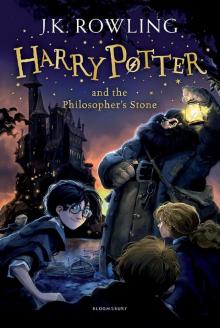 Harry Potter and the Philosophers Stone
Harry Potter and the Philosophers Stone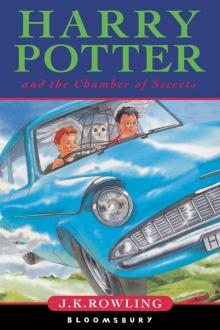 Harry Potter and the Chamber of Secrets
Harry Potter and the Chamber of Secrets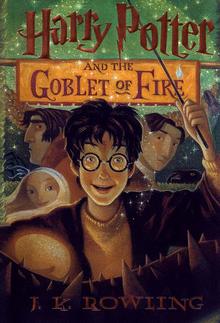 Harry Potter and the Goblet of Fire
Harry Potter and the Goblet of Fire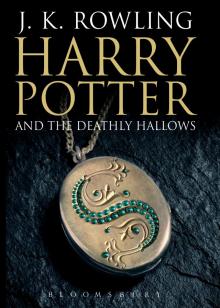 Harry Potter and the Deathly Hallows
Harry Potter and the Deathly Hallows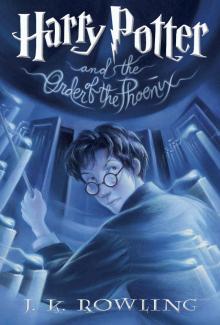 Harry Potter and the Order of the Phoenix
Harry Potter and the Order of the Phoenix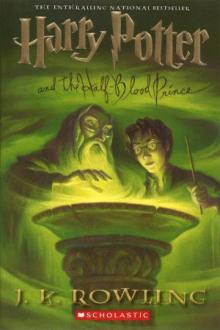 Harry Potter and the Half-Blood Prince
Harry Potter and the Half-Blood Prince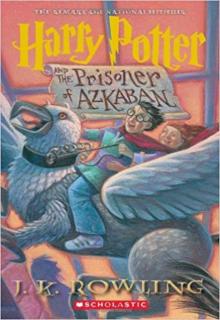 Harry Potter and the Prisoner of Azkaban
Harry Potter and the Prisoner of Azkaban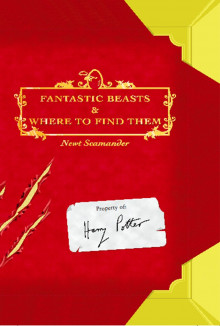 Fantastic Beasts and Where to Find Them
Fantastic Beasts and Where to Find Them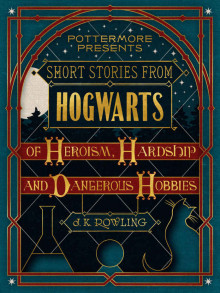 Short Stories from Hogwarts of Heroism, Hardship and Dangerous Hobbies
Short Stories from Hogwarts of Heroism, Hardship and Dangerous Hobbies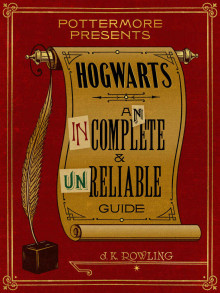 Hogwarts: An Incomplete and Unreliable Guide
Hogwarts: An Incomplete and Unreliable Guide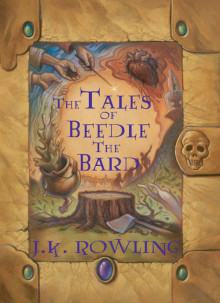 The Tales of Beedle the Bard
The Tales of Beedle the Bard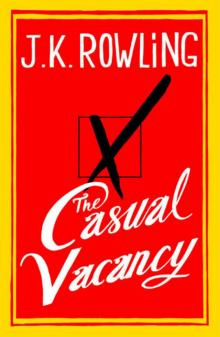 The Casual Vacancy
The Casual Vacancy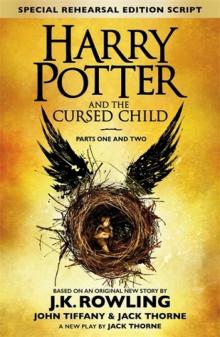 Harry Potter and the Cursed Child
Harry Potter and the Cursed Child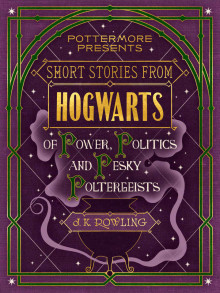 Short Stories from Hogwarts of Power, Politics and Pesky Poltergeists
Short Stories from Hogwarts of Power, Politics and Pesky Poltergeists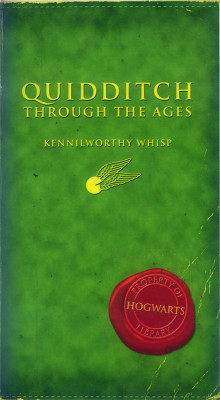 Quidditch Through the Ages
Quidditch Through the Ages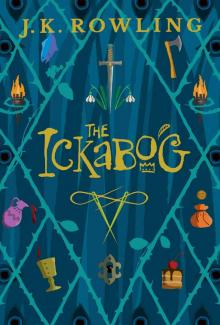 The Ickabog
The Ickabog![Fantastic Beasts, The Crimes of Grindelwald [UK] Read online](http://i1.bookreadfree.com/i/03/19/fantastic_beasts_the_crimes_of_grindelwald_uk_preview.jpg) Fantastic Beasts, The Crimes of Grindelwald [UK]
Fantastic Beasts, The Crimes of Grindelwald [UK]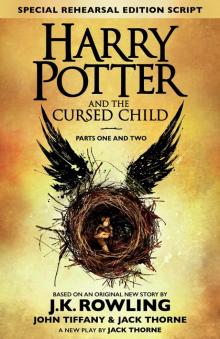 Harry Potter and the Cursed Child: Parts One and Two
Harry Potter and the Cursed Child: Parts One and Two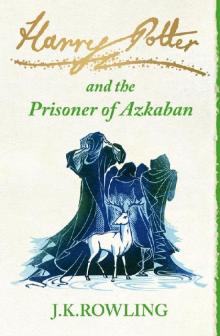 The Prisoner of Azkaban
The Prisoner of Azkaban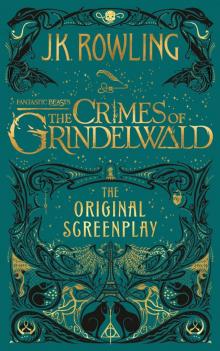 Fantastic Beasts: The Crimes of Grindelwald
Fantastic Beasts: The Crimes of Grindelwald The Hogwarts Library Collection
The Hogwarts Library Collection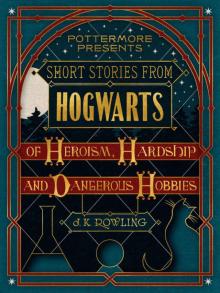 Short Stories from Hogwarts of Heroism, Hardship and Dangerous Hobbies (Kindle Single) (Pottermore Presents)
Short Stories from Hogwarts of Heroism, Hardship and Dangerous Hobbies (Kindle Single) (Pottermore Presents)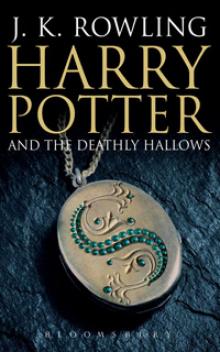 Harry Potter and the Deathly Hallows hp-7
Harry Potter and the Deathly Hallows hp-7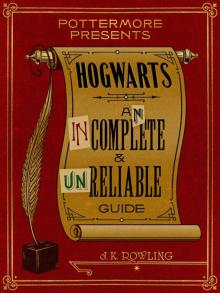 Hogwarts: An Incomplete and Unreliable Guide (Kindle Single) (Pottermore Presents)
Hogwarts: An Incomplete and Unreliable Guide (Kindle Single) (Pottermore Presents)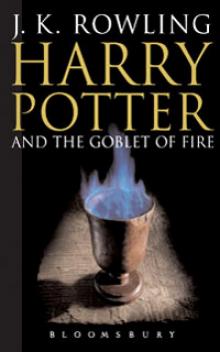 Harry Potter and the Goblet of Fire hp-4
Harry Potter and the Goblet of Fire hp-4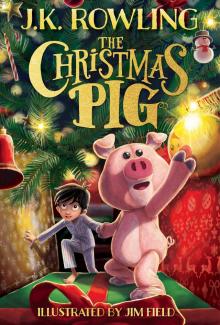 The Christmas Pig
The Christmas Pig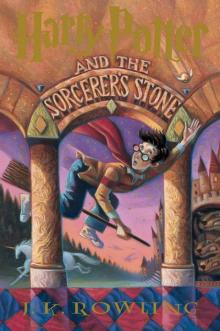 Harry Potter and the Sorcerer's Stone
Harry Potter and the Sorcerer's Stone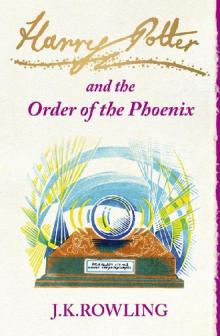 The Order of the Phoenix
The Order of the Phoenix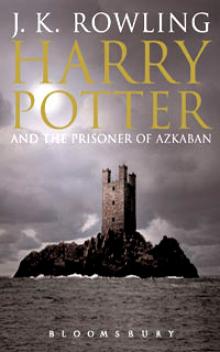 Harry Potter and the Prisoner of Azkaban hp-3
Harry Potter and the Prisoner of Azkaban hp-3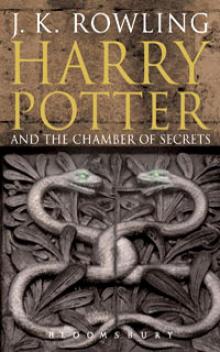 Harry Potter and the Chamber of Secrets hp-2
Harry Potter and the Chamber of Secrets hp-2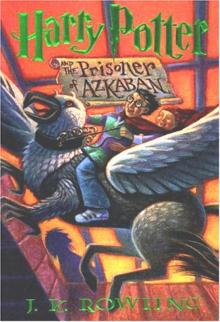 HP 3 - Harry Potter and the Prisoner of Azkaban
HP 3 - Harry Potter and the Prisoner of Azkaban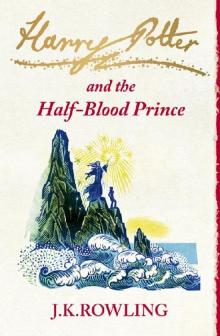 The Half-Blood Prince
The Half-Blood Prince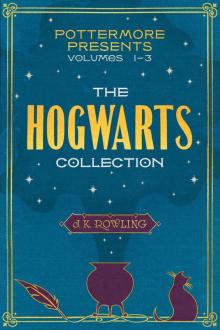 The Hogwarts Collection
The Hogwarts Collection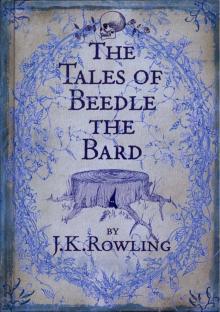 Tales of Beedle the Bard
Tales of Beedle the Bard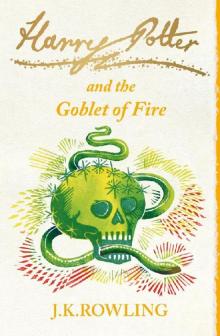 The Goblet of Fire
The Goblet of Fire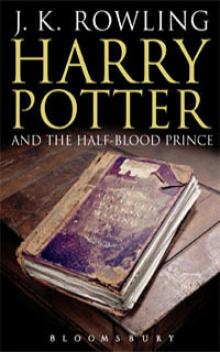 Harry Potter and the Half-Blood Prince hp-6
Harry Potter and the Half-Blood Prince hp-6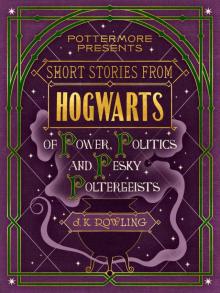 Short Stories from Hogwarts of Power, Politics and Pesky Poltergeists (Kindle Single) (Pottermore Presents)
Short Stories from Hogwarts of Power, Politics and Pesky Poltergeists (Kindle Single) (Pottermore Presents)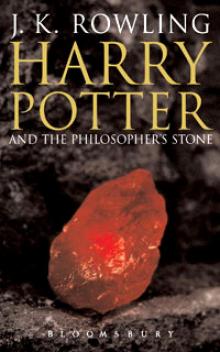 Harry Potter and the Sorcerer's Stone hp-1
Harry Potter and the Sorcerer's Stone hp-1